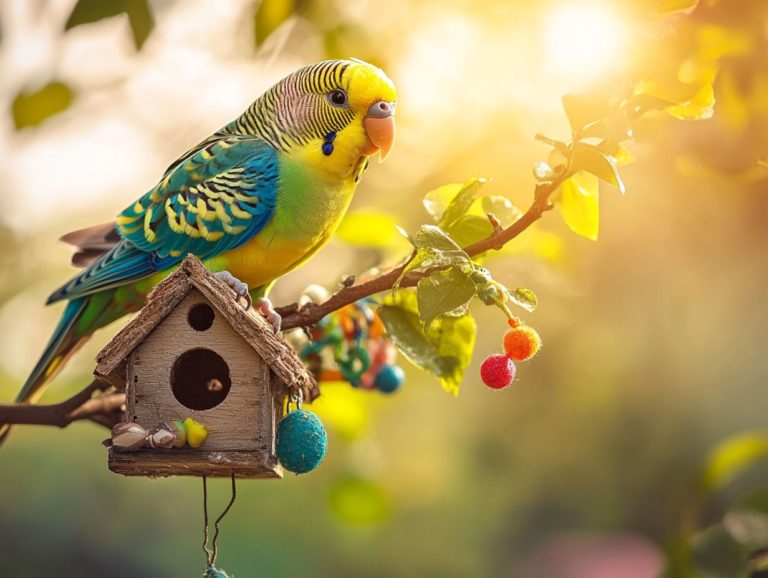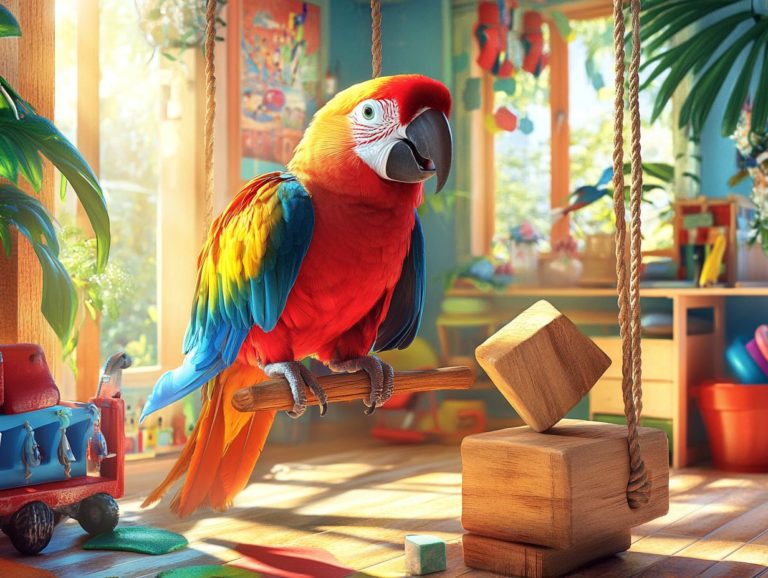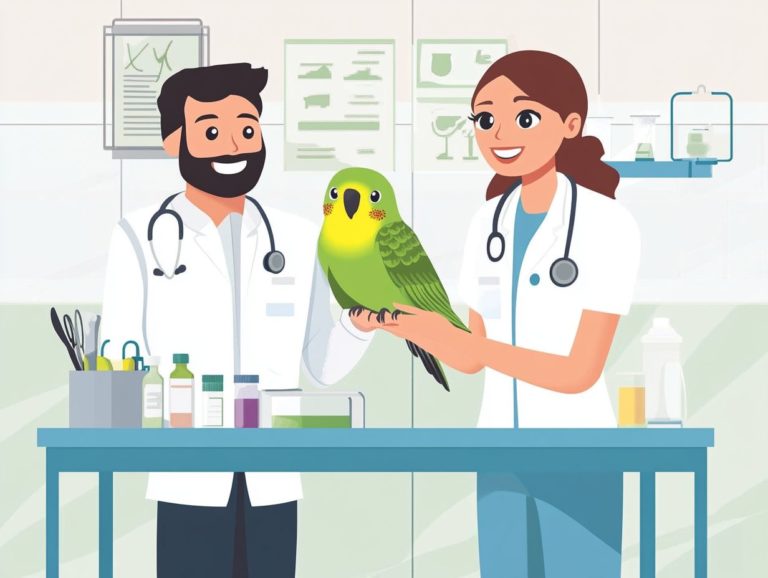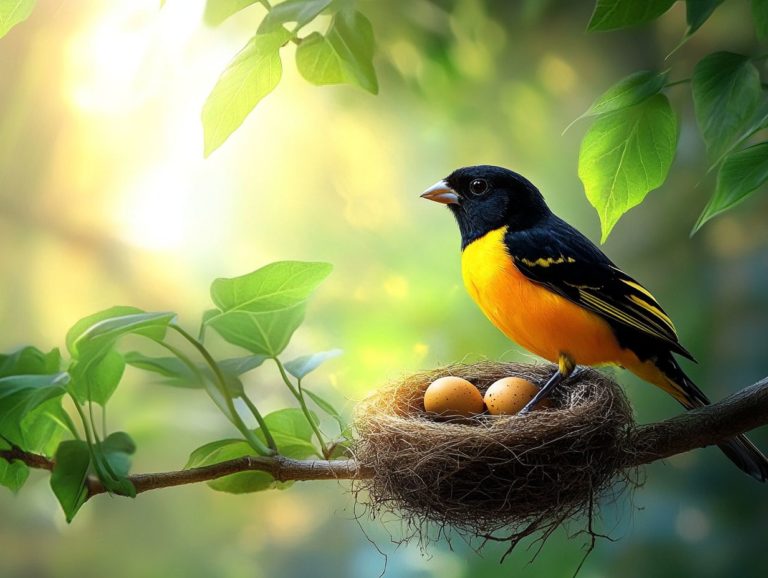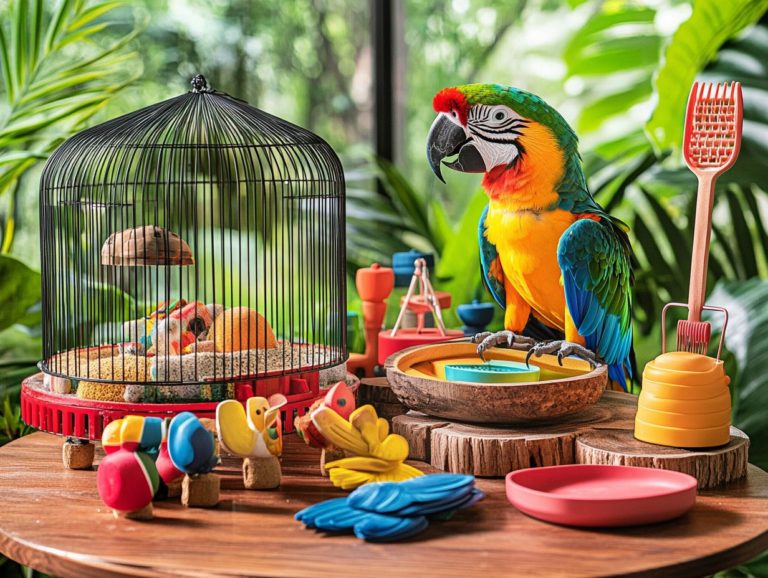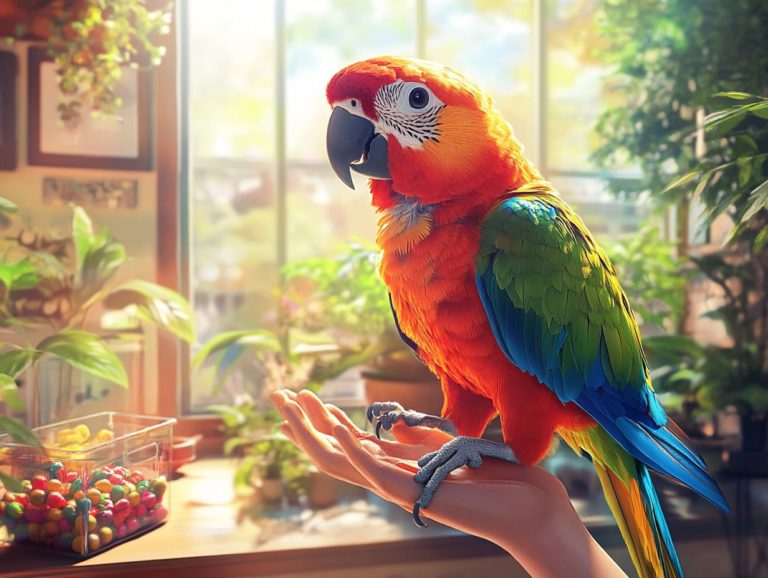10 Myths About Parrot Care Debunked
Caring for a parrot can be an incredibly rewarding journey. However, misconceptions often obscure the reality of what it takes to keep these vibrant creatures happy and healthy.
From their diet to their social needs, many myths can easily mislead prospective parrot owners. This article aims to debunk ten prevalent myths about parrot care, illuminating the essential truths every bird enthusiast should know.
Discover the significance of proper nutrition, socialization, and much more your feathered friend will undoubtedly appreciate your efforts!
Contents
- Key Takeaways:
- 10 Myths About Parrot Care Debunked
- Myth #1: Parrots Can Eat Any Human Food
- Myth #2: Parrots Don’t Need Social Interaction
- Myth #3: Parrots Can Be Left Alone for Long Periods of Time
- Myth #4: Parrots Don’t Need Regular Vet Check-ups
- Myth #5: Parrots Can Be Kept in Small Cages
- Myth #6: Parrots Don’t Need Mental Stimulation
- Myth #7: Parrots Only Need Water to Bathe
- Myth #8: Parrots Can’t Be Trained
- Myth #9: Parrots Don’t Live Long
- Myth #10: Parrots Make Great Starter Pets
- Frequently Asked Questions
Key Takeaways:
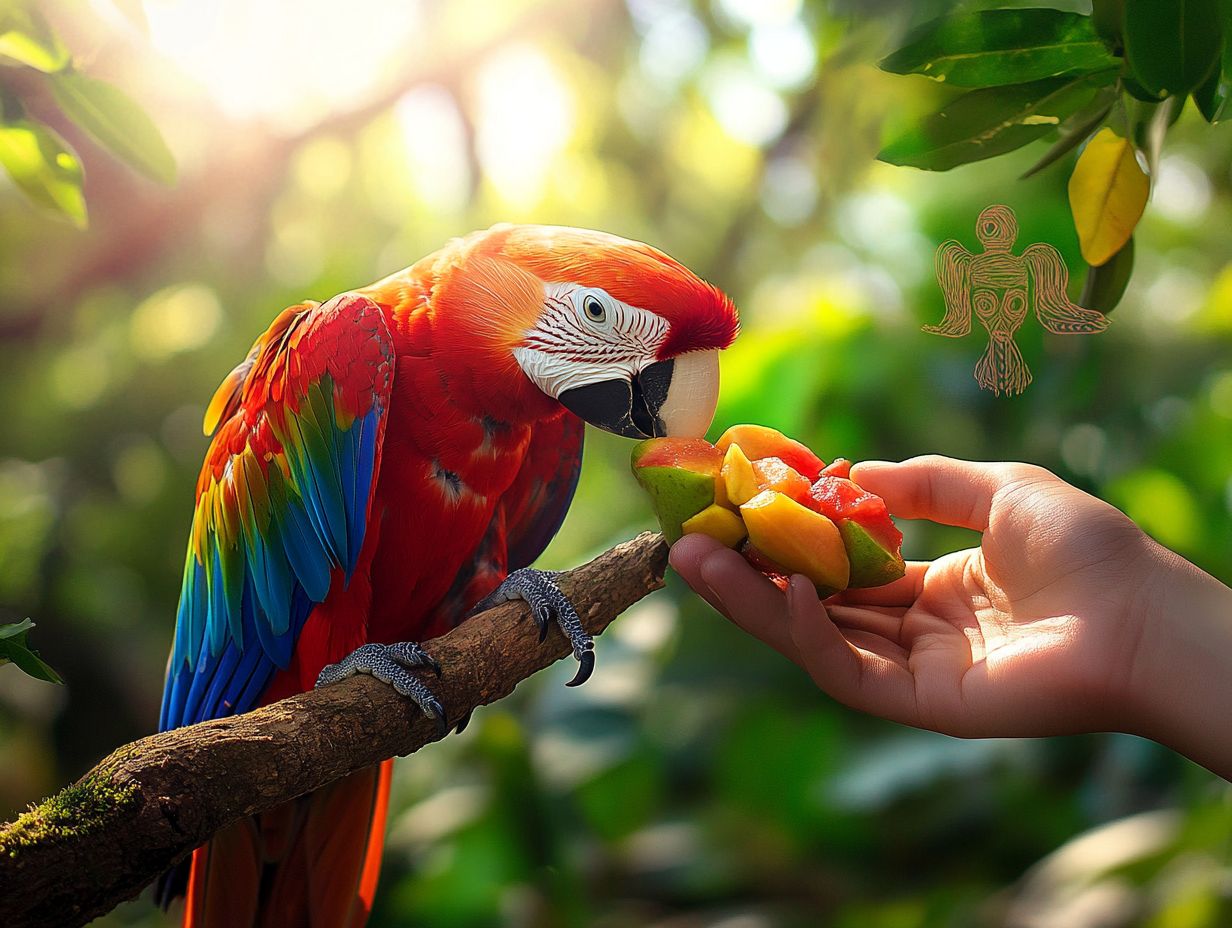
- Your parrot needs a tasty and balanced diet and cannot eat any human food, highlighting the importance of their diet needs.
- Parrots are highly social creatures that need regular interaction with their owners.
- Leaving a parrot alone for long periods can harm their well-being; they thrive on daily attention and require regular vet check-ups for optimal health.
10 Myths About Parrot Care Debunked
Understanding the reality behind the ten myths of parrot care is crucial for the well-being of these vibrant feathered companions. For more insights, check out common myths about pet birds. Parrots, while beloved pets, demand a dedication to their health and happiness that is frequently misinterpreted.
Understanding their specific diet needs is an essential part of pet ownership. The myths surrounding their care can lead to misguided ownership practices, ultimately impacting their lifespan and overall quality of life.
By dispelling these misconceptions, you can enhance the care you provide and ensure your bird friends thrive in their environments, especially by learning about parrot behavior.
Why Proper Care is Essential
Proper care for parrots is essential to ensure their health, longevity, and happiness. These social animals thrive on the deep connections they form with their owners and require daily attention to foster a strong bond.
To truly flourish, it s important that these vibrant companions receive a varied and balanced diet that includes hand feeding, alongside plenty of opportunities for social interaction. Parrots are incredibly intelligent, and without engaging activities and companionship, they can quickly become bored or unhappy.
The environment you create for them significantly impacts their overall well-being. A spacious cage filled with stimulating toys and safe exploration areas is not just a luxury it s a necessity.
Regular veterinary check-ups are crucial for monitoring their health, preventing ailments, and effectively addressing their dietary needs.
By focusing on these vital aspects of parrot care, you can greatly enrich the lives of your feathered friends and debunk common bird food myths to foster a fulfilling companionship.
Myth #1: Parrots Can Eat Any Human Food
As a parrot owner, it’s easy to fall into the misconception that your feathered companion can enjoy any human food. However, embracing this myth could jeopardize their health, so it’s important to be aware of the 5 nutritional myths about birds.
It s crucial to understand their specific dietary needs and maintain a proper nutritional balance to ensure their well-being.
The Truth About a Parrot’s Diet
A parrot’s diet should be a carefully curated blend of seeds, pellets, fruits, and vegetables to ensure optimal health and energy levels. This diverse menu not only supports their physical well-being but also plays a vital role in their mental stimulation and overall happiness.
Incorporating a variety of leafy greens, like kale and spinach, provides essential vitamins, while fruits such as apples, berries, and bananas deliver natural sugars and antioxidants. High-quality pellets are critical, offering a complete range of nutrients tailored specifically to your parrot’s species.
When sourcing their food, it’s wise to shop at reputable pet stores or consult with aviculturists like Irene Pepperberg for advice. Look for organic or specially formulated options that minimize artificial additives, ensuring your vibrant companion receives the best nutritional value possible.
Share this knowledge with fellow bird lovers and help them provide the best care for their feathered friends!
Myth #2: Parrots Don’t Need Social Interaction
Contrary to popular belief, parrots are remarkably social creatures that thrive on regular interaction with their owners. This highlights the importance of daily attention and the bonding process, which are essential for their emotional and mental well-being.
By engaging with them consistently, you foster a deeper connection that enriches both your lives.
The Importance of Socialization for Parrots
Socialization is crucial for your parrot’s well-being. It helps prevent behavioral issues and ensures a happier, healthier companion.
Engaging these intelligent creatures in interactive activities not only strengthens your bond but also stimulates their minds. Without adequate socialization, your parrot might feel lonely, which can lead to stress and various health concerns.
It s essential to introduce your feathered friend to different environments. This allows them to meet new people and experience a variety of sounds and sights. Encouraging playtime with other pets can enhance their social skills, but remember that supervision is key to maintaining harmony.
Regular handling, talking, and even training sessions will help cultivate a well-adjusted parrot that feels secure and cherished in your home, reducing the risk of behavioral issues.
Myth #3: Parrots Can Be Left Alone for Long Periods of Time
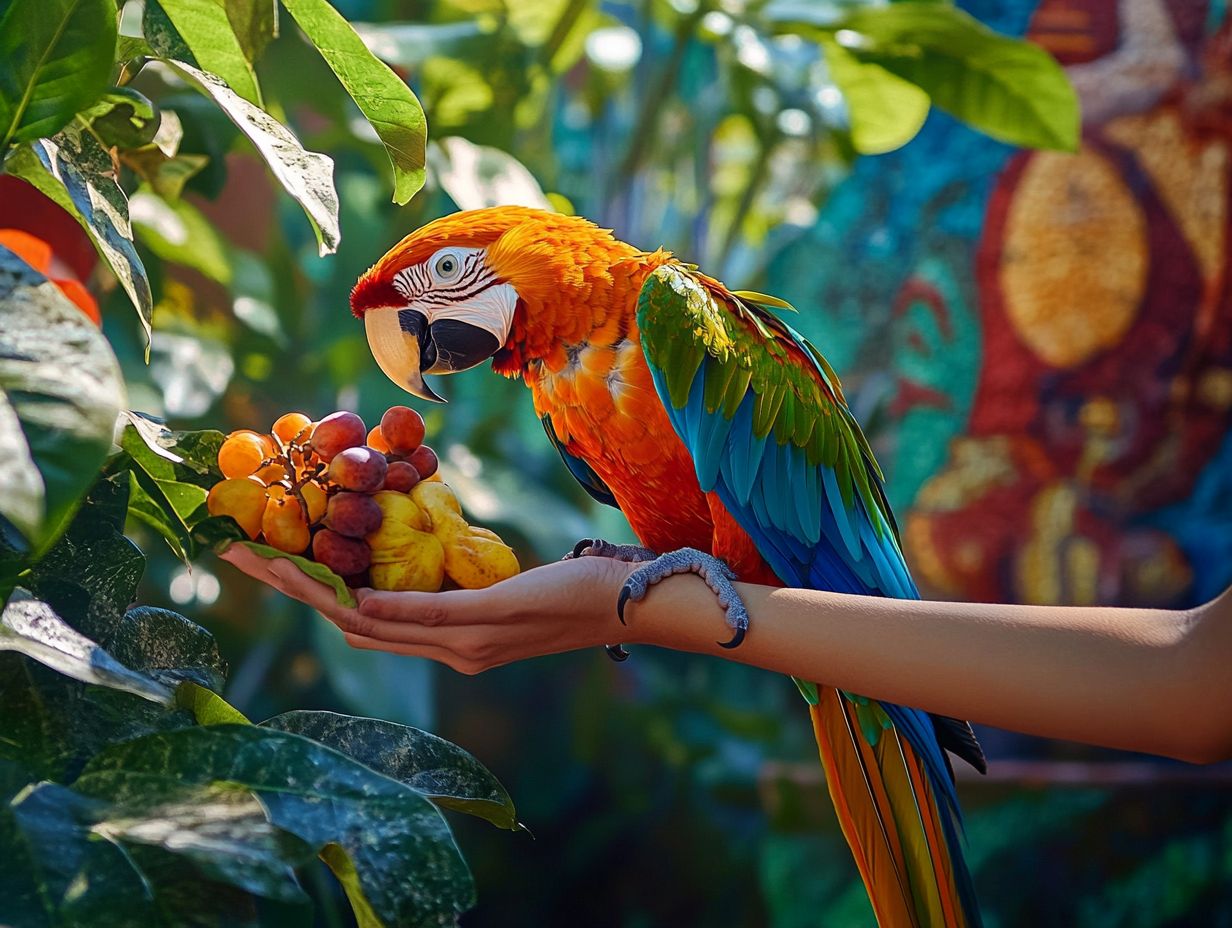
Leaving your parrots unattended for long stretches can result in serious behavioral issues and health concerns, including catching illnesses from their surroundings. It s vital to understand how much they crave your attention!
The Risks of Leaving a Parrot Unattended
The risks of leaving parrots unattended can lead to a host of issues. These range from behavioral problems like excessive screaming or feather plucking to serious health concerns, underscoring the importance of a thorough cleaning routine.
These risks show why a nurturing environment is essential for these intelligent beings. Parrots flourish in settings where they feel secure and mentally stimulated.
Establishing a meticulous cleaning routine, including regular cleaning of their living space, is essential. Regularly disinfecting their area and ensuring they have fresh food and water can significantly reduce the risk of illness and promote their overall health.
Keeping a close eye on their interactions with toys and household items is crucial to protect them from potential hazards. Frequent observation of their behavior can help you catch any signs of stress or illness early, allowing you to take swift action to safeguard their well-being.
Myth #4: Parrots Don’t Need Regular Vet Check-ups
Many parrot owners mistakenly think that their feathered companions don t require regular veterinary care, including check-ups at a pet hospital. However, these check-ups are essential for maintaining their health and ensuring a long, joyful life.
The Importance of Regular Health Assessments
Regular health assessments are vital for your parrot. They allow veterinarians to identify potential health concerns early and provide the necessary treatment, which is particularly important for species such as Macaws, Cockatoos, and African Grey parrots.
These evaluations should encompass comprehensive physical examinations and blood tests to monitor organ function. Consistent checks for any signs of infectious diseases are also crucial. Don t wait until your parrot shows signs of illness; regular vet visits can save their life!
You can’t underestimate the importance of vaccinations; they protect these vibrant creatures from a range of illnesses that could seriously affect their well-being. Equally important is parasite prevention, which shields against both internal and external parasites that can cause significant health complications.
By staying proactive with health checks and ensuring proper vaccinations and parasite control, you can greatly enhance the longevity and overall vitality of your feathered companion, reflecting your commitment to parrot care.
Myth #5: Parrots Can Be Kept in Small Cages
The misconception that parrots can flourish in small cages frequently results in subpar living conditions for these social animals. In reality, these vibrant birds need ample space to move, play, and sustain their health. A proper environment supports their natural instincts and well-being.
Providing a spacious cage adorned with various toys, perches, and grooming areas is essential for their happiness and overall well-being, just as one would consider for other pets like guinea pigs and hamsters. The cage should be large enough to allow for free movement and flying, powering these intelligent creatures to stretch their wings and explore their environment.
Beyond just ample space, it s vital to introduce stimulating elements that engage their minds, such as puzzles and interactive toys that encourage curiosity and play.
Safety is paramount; the cage must be crafted from non-toxic materials, without sharp edges and positioned away from potential hazards like drafts or direct sunlight, ensuring a secure environment for your feathered companion. Whether you’re setting up a cozy habitat at home or exploring options at a pet store like Bird Street Bistro, consider the unique needs of your parrot to create the perfect blend of comfort and exploration.
Myth #6: Parrots Don’t Need Mental Stimulation
The common misconception that parrots don t need mental stimulation can pave the way for serious behavioral issues, including stress-induced behaviors. Engaging activities are crucial for ensuring they remain happy and healthy.
The Importance of Enrichment for Parrots
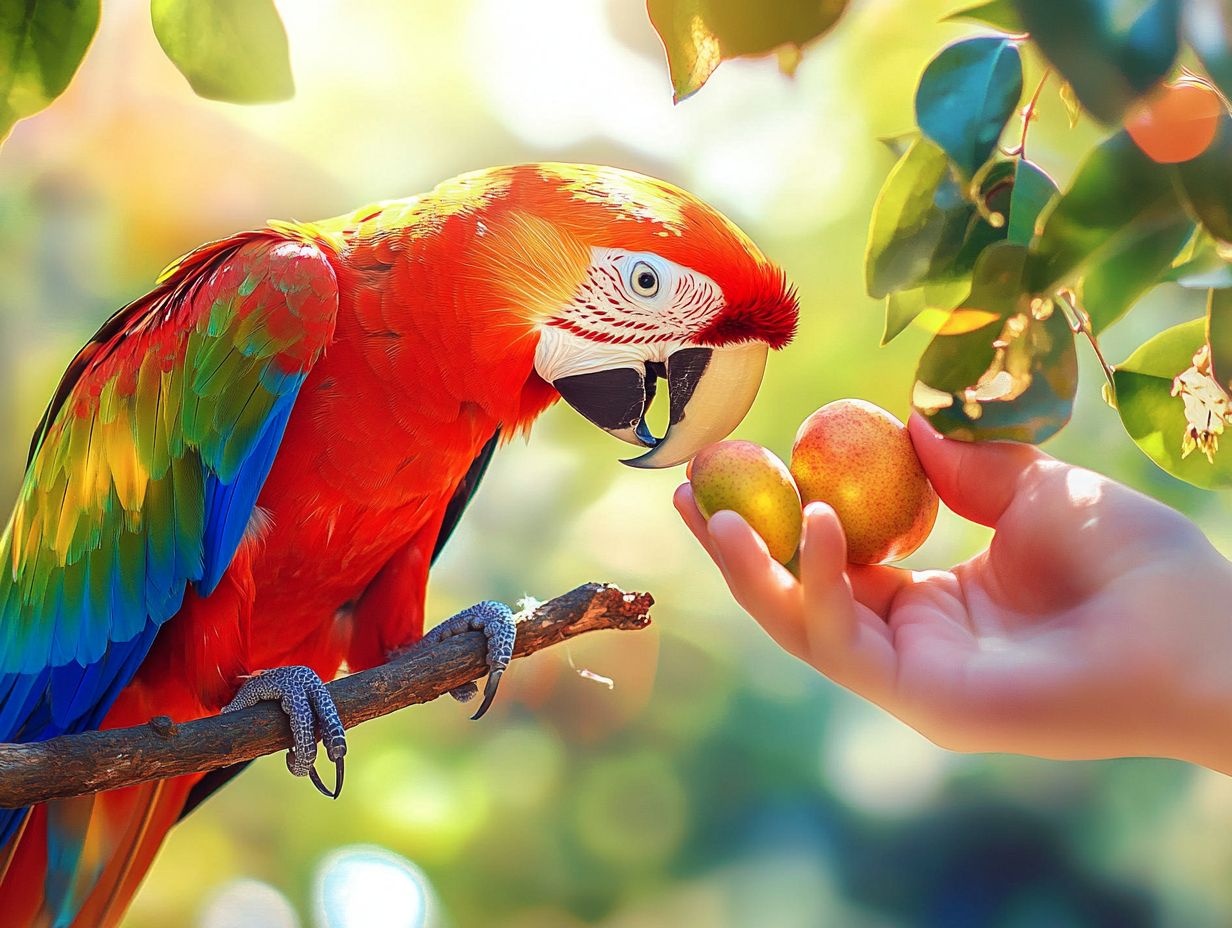
Enrichment activities that keep your parrot active and happy are absolutely essential, as they play a crucial role in preventing behavioral issues while fostering a deep bond through interactive play.
By weaving a variety of enrichment activities into their daily routine, such as engaging puzzle toys that challenge their problem-solving abilities, you can provide the mental stimulation vital for their happiness. Creating foraging opportunities where they can hunt for hidden treats mimics their natural instincts and keeps them thoroughly engaged. Social interactions whether through playdates with other birds or quality time spent with you are also significant in enhancing their emotional well-being.
All of these enrichment methods contribute to a satisfying and fulfilling life, making it imperative for you as a parrot owner to prioritize these enriching activities. Get started on enriching your parrot’s life today!
Myth #7: Parrots Only Need Water to Bathe
While water is indeed essential for bathing, the notion that parrots require it solely for grooming overlooks the importance of a consistent cleaning routine and diverse grooming techniques specifically designed to meet their unique needs.
The Benefits of Regular Bathing for Parrots
Regular bathing is essential for your parrots, as it keeps their feathers pristine, promotes hydration, and enhances their overall health.
You have various methods at your disposal to ensure these vibrant creatures savor their bathing experience. Misting is a gentle yet effective option; a fine spray of water can mimic a light rain, something many parrots absolutely adore. Alternatively, shallow baths allow them to splash around, turning bath time into a playful activity while ensuring a thorough cleaning.
Beyond the act of bathing, maintaining a clean environment is vital for their well-being. A tidy space reduces the risk of infections and keeps harmful bacteria at bay. When your feathered friends have access to clean water and enjoy regular bathing, they flourish, revealing their true colors and embodying happiness and health.
Myth #8: Parrots Can’t Be Trained
Many people mistakenly believe that parrots can t be trained, overlooking their remarkable intelligence and ability to learn. Recognizing this capacity is essential for fostering a successful bond and effectively managing their behavior.
The Truth About Parrot Training
Training a parrot can be an immensely rewarding journey for you. It enhances communication and interaction while effectively minimizing behavioral issues. It s essential to spend time every day and be patient in this process.
Utilizing effective training methods, particularly positive reinforcement, is crucial in building trust and understanding between you and your feathered friend. Consistency in your training sessions is vital. Regular practice not only reinforces commands but also provides essential mental stimulation for your parrot. This engagement is key to ensuring your parrot s happiness and overall well-being.
Engaging them through games, tricks, and new challenges creates a joyful environment that deepens your bond. It allows your parrot to feel secure and content. Ultimately, a well-trained parrot becomes a happier, more harmonious companion in your life.
Myth #9: Parrots Don’t Live Long
Many assume that parrots have short lifespans. However, with the right care, nutrition, and regular veterinary check-ups, these remarkable birds can thrive for decades.
This shows how crucial it is to make a long-term commitment for anyone considering bringing a parrot into their life.
The Average Lifespan of a Parrot
The average lifespan of a parrot can vary dramatically depending on the species. Take the African Grey or Hyacinth Macaw, for example. With proper care, they can thrive for 50 years or more.
On the other end of the spectrum, smaller breeds like budgerigars or lovebirds tend to have shorter lifespans, typically ranging from 5 to 15 years. Several factors influence this longevity, including genetics, diet, and environmental conditions.
Your approach to care is crucial in ensuring these vibrant creatures enjoy long, healthy lives. A balanced diet filled with vegetables, fruits, and fortified pellets is essential for their well-being. It s vital to provide mental stimulation and social interaction to stave off stress and loneliness, which can lead to health issues.
By understanding these factors, you can significantly enhance their quality of life.
Myth #10: Parrots Make Great Starter Pets
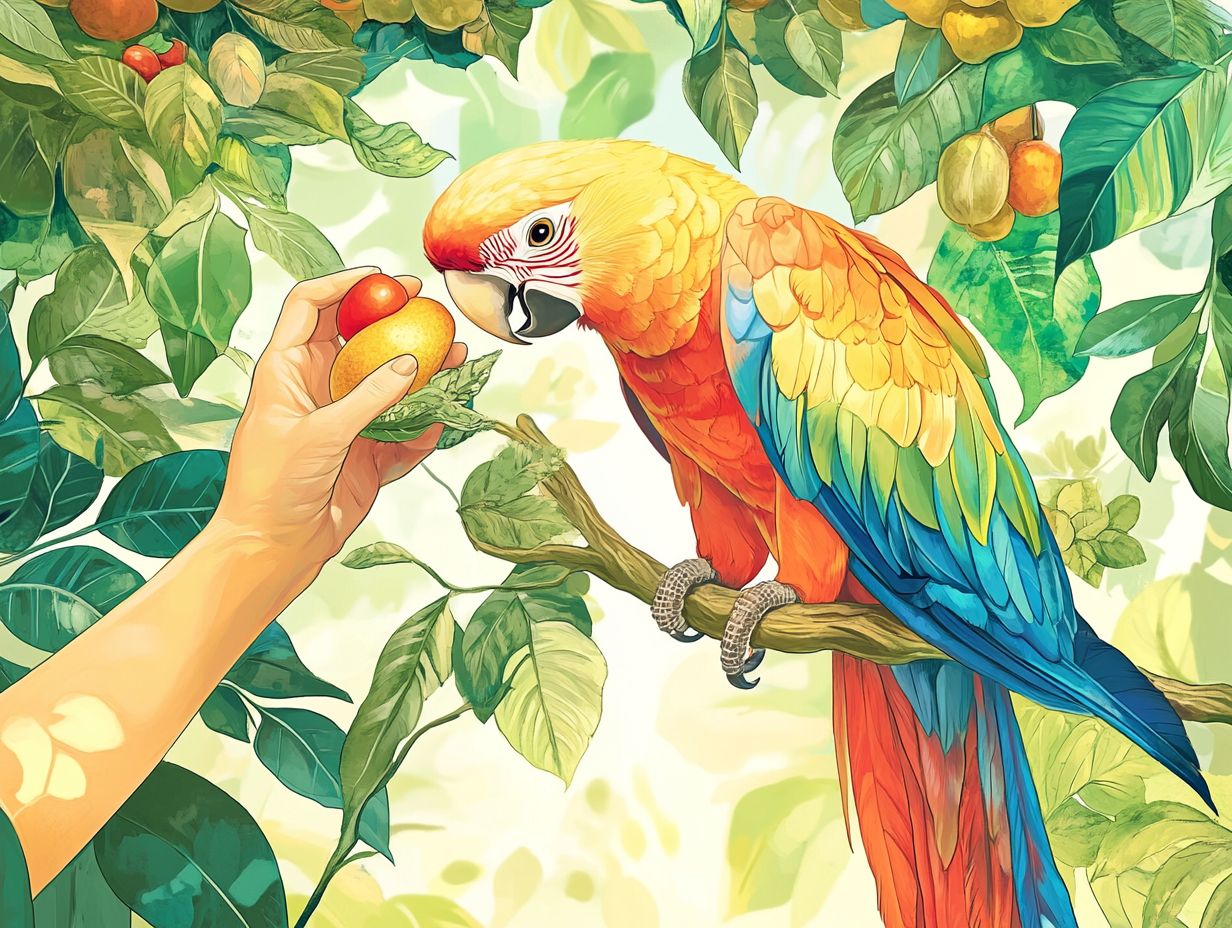
The notion that parrots are ideal starter pets oversimplifies the intricate realities of their care, social requirements, and the considerable lifespan commitment they demand, as discussed in bird adoption myths.
Understanding these factors is crucial for fostering responsible and informed pet ownership.
The Reality of Owning a Parrot
Owning a parrot is both a rewarding and demanding journey. It requires you to forge a deep bond through daily attention, social interaction, and a steadfast commitment to their well-being.
These vibrant companions thrive on your engagement. They often need several hours of dedicated time each day to interact with you, explore their surroundings, and participate in stimulating activities. Understanding their nutritional and environmental needs is essential; a balanced diet and a well-equipped cage are critical for their physical health.
As a potential parrot owner, be prepared for the noise and mess that come with these lively pets. However, the joy they bring through their playful antics and affectionate nature easily eclipses these challenges. This creates a uniquely fulfilling bond that will enrich your life for years to come.
Frequently Asked Questions
Here are some common questions people ask about parrot care:
What are the most common myths about parrot care?
Some of the most common myths about birds include the belief that all parrots can talk, that they can subsist on just seeds, and that they don’t require interaction with their owners. For more details, see the common myths about cockatiels explained.
Do all parrots have the ability to talk?
No, not all parrots can talk. While some species, like African Greys, are known for their talking abilities, others may not be as vocal or able to imitate human speech.
Can parrots survive on a diet of just seeds?
No, parrots need a diverse and balanced diet that includes fruits, vegetables, and protein sources. A diet consisting of just seeds can lead to malnutrition and health problems.
Act now to ensure your parrot thrives and receives the best care possible!
Is it true that parrots don’t need much interaction with their owners?
Parrots are social creatures! They need daily interaction and mental stimulation. Without proper socialization, they can become unhappy pets!
Do parrots make good pets for children?
Not all parrots are suitable pets for children. They require a lot of care and attention.
Is it necessary to cover a parrot’s cage at night?
It’s not necessary to cover a parrot’s cage at night. A consistent sleep schedule with some ambient light helps them feel secure.

